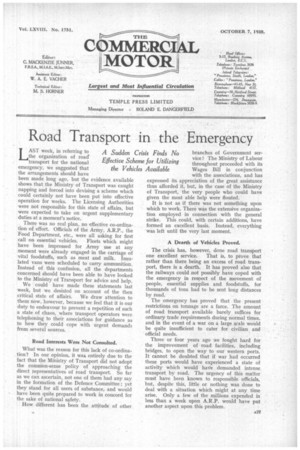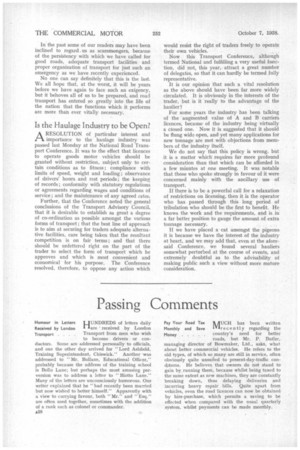Road Transport in the Emergency
Page 29

Page 30

If you've noticed an error in this article please click here to report it so we can fix it.
T AST week, in referring to Lathe organization of road' transport for the national emergency, we suggested that the arrangements should have been made long ago, but the evidence available shows that the Ministry of Transport was caught napping and forced into devising a scheme which could certainly not have been put into effective operation for weeks. The Licensing Authorities were not responsible for this state of affairs, but were expected to take on urgent supplementary duties at a moment's notice.
There was no real plan, no effective co-ordination of effort. Officials of the Army, A.R.P., the Food Department, etc., were all asking for first call on essential vehicles. Fleets which might have been impressed for Army use at any moment were already engaged in the carriage of vital foodstuffs, such as meat and milk. Insulated vans were scheduled to carry ammunition. Instead of this confusion, all the departments concerned should have been able to have looked to the Ministry of Transport for advice and help. We could have made these statements last week, but we desisted on account of the then critical state of affairs. We draw attention to them now, however, because we feel that it is our duty to endeavour to prevent a repetition of such a state of chaos, where transport operators were telephoning to their associations for guidance as to how they could cope with urgent demands from several sources.
Road Interests Were Not Consulted.
What was the reason for this lack of co-ordination? In our opinion, it was entirely due to the fact that the Ministry of Transport did not adopt the common-sense policy of approaching the direct representatives of road transport. So far as we can ascertain, not one of them had any say in the formation of the Defence Committee ; yet they stand for all users of substance, and would have been quite prepared to work in concord for the sake of national safety. How different has been the attitude of other branches of Government service! The Ministry of Labour throughout proceeded with its Wages Bill in conjunction with the associations, and has expressed its appreciation of the great assistance thus afforded it, but, in the case of the Ministry of Transport, the very people who could have given the most able help were flouted. It is not as if there was not something upon which to work. There was the extensive organization employed in connection with the general strike. This could, with certain additions, have formed an excellent basis. Instead, everything was left until the very last moment.
A Dearth of Vehicles Proved.
The crisis has, however, done road transport one excellent service. That is, to prove that rather than there being an excess of road transport, there is a dearth. It has proved also that the railways could not possibly have coped with the emergency in respect of the movement of people, essential supplies and foodstuffs, for thousands of tons had to be sent long distances by road.
The emergency has proved that the present restrictions on tonnage are a farce. The amount of road transport available barely suffices for ordinary trade requirements during normal times, and in the event of a war on a large scale would be quite insufficient to cater for civilian and official needs.
Three or four years ago we fought hard for the improvement of road facilities, including bridges, to open the way to our western ports. It cannot be doubted that if war had occurred these ports would have experienced a state of activity which would ha* demanded intense transport by road. The urgency of this matter must have been known to responsible officials, but, despite this, little or nothing was done to deal with a situation which might at any time arise. Only a few of the millions expended in less than a week upon A.R.P. would have put another aspect upon this problem. In the past some of our readers may have been inclined to regard .us as scaremongers, because of the persistency with which we have called for good roads, adequate transport facilities and proper organization of transport for just such an emergency as we have recently experienced. No one can say definitely that this is the last. We all hope that, at the worst, it will be years before we have again to face such an exigency, but it behoves all of us to be prepared, and road transport has entered so greatly into the life of the nation that the functions which it performs are more than ever vitally necessary.
Is the Haulage Industry to be Open?
ARESOLUTION of particular interest and importance to the haulage industry was passed last Monday at the National Road Transport Conference. It was to the effect that licences to operate goods motor vehicles should be granted without restriction, subject only to certain conditions as to fitness; compliance with limits of speed, weight and loading ; observance of drivers' hours and rest periods; the keeping of records ; conformity with statutory regulations or agreements regarding wages and conditions of service ; and the maintenance of any agreed vates.
Further, that the Conference noted the general conclusions of the Transport Advisory Council, that it is desirable to establish as great a degree of co-ordination as possible amongst the various forms of transport; that the best line of approach is to aim at securing for traders adequate alternative facilities, care being taken that the resultant competition is on fair terms; and that there should be unfettered right on the part of the• trader to select the form of transport which he approves and which is most convenient and economical for his purpose. The Conference resolved, therefore, to oppose any action which would resist the right of traders freely to operate their own vehicles.
Now this Transport Conference, although termed National and fulfilling a very useful function, did not, this year, attract a great number of delegates, so that it can hardly be termed fully representative.
It is our opinion that such a vital resolution as the above should have been far more widely circulated. It is obviously in the interests of the trader, but is it 'really to the advantage of the haulier?
For some years the industry has been talking of the augmented value of A and B carriers licences, because of the industry being virtually a closed one. Now it is suggested that it should be flung wide open, and yet many applications for new tonnage are met with objections from members of the industry itself. We do not say that this policy is wrong. but it is a matter which requires far more profound consideration than that which can be afforded in a few minutes at one meeting. It was notable that those who spoke strongly in favour of it were concerned mainly with the ancillary use of transport.
If there is to be a powerful call for a relaxation of restrictions on licensing, then it is the operator who has passed through this long period of tribulation who should be the first to benefit. He knows the work and the requirements, and is in a far better position to gauge the amount of extra tonnage necessary.
If we have placed a cat amongst the pigeons it is because we have the interest of the industry at heart, and we may add that, even at the aforesaid Conference, we found several hauliers somewhat perturbed at the course of events, and extremely doubtful as to the advisability of making public such a view without more mature consideration.




















































































